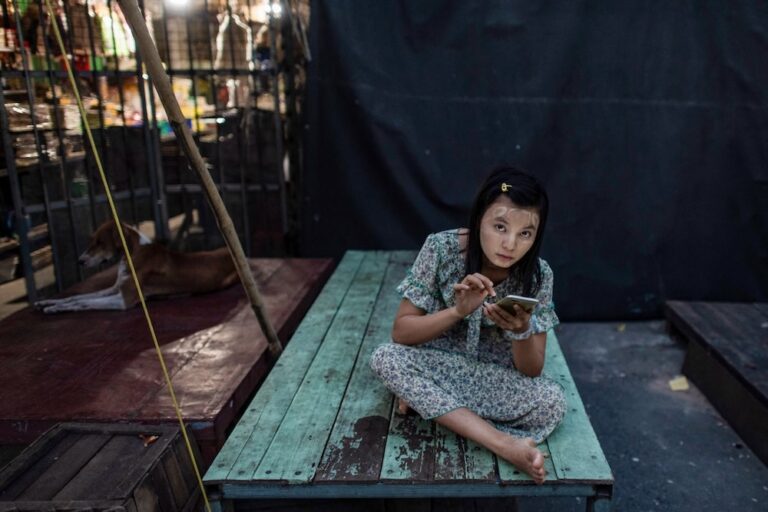The release of the political prisoners should be followed by reforms to ensure respect for fundamental rights and freedoms, says Human Rights Watch.
(Human Rights Watch/IFEX) – London, October 12, 2011 – The release of at least 120 political prisoners in Burma should be followed by legal and policy reforms to ensure respect for fundamental rights and freedoms, Human Rights Watch said today.
On October 12, 2011, the Burmese government released approximately 120 political prisoners, including famed comedian Zargana, and U Gambira, a Buddhist monk and prominent leader of the 2007 protests. Their release was part of a government amnesty of 6,359 prisoners said to be of “old age, suffering poor health and disability [and] whose moral behavior has improved after serving an appropriate amount of time.” The government did not say how many political detainees were included.
“Those political prisoners released have suffered immeasurably and should never have been put in Burma’s miserable jails in the first place,” said Elaine Pearson, deputy Asia director at Human Rights Watch. “The laws that put them behind bars are still on the books and can be used again at any time. If the government wants to show it is really different from its predecessors, it should convene parliament and repeal laws criminalizing peaceful political speech.”
Human Rights Watch called on the Burmese government to ensure that all prisoners sentenced for peaceful political activities, regardless of whether charges stemmed from security laws or criminal charges designed to suppress dissent, are immediately and unconditionally released.
Following peaceful protests in August and September 2007, the number of political prisoners in Burma effectively doubled, to an estimated 2,100, when security forces rounded up members of the 88 Generation Students, Buddhist monks and nuns, journalists, and other activists. Many political detainees were sentenced under vague provisions of the Penal Code and Associations Act, designed to limit freedom of association, assembly, and expression, or under the Electronic Transactions Act, which has been used to prosecute people for giving interviews to foreign media or sending information abroad.
In some cases, the authorities brought trumped-up charges of possession of explosives, firearms, or pornography, or politically motivated prosecutions under draconian laws such as the 1975 State Protection Act, or based on arcane Penal Code provisions for sedition, insulting religion, or calling for an army mutiny. Human Rights Watch’s 2009 report “Burma’s Forgotten Prisoners” featured many of the prominent political prisoners and details of their arrests and trials.
Many political prisoners including the democracy leader Aung San Suu Kyi, the comedian Zargana, and the 88 Generation Students leader Min Ko Naing have been periodically released and then re-arrested. Zargana was incarcerated between 1988 and 1989, between 1989 and 1993, and for a month in 2007 following his support for demonstrations led by Buddhist monks. Authorities arrested him again in May 2009 following his criticism of the government’s handling of Cyclone Nargis in 2008, and sentenced him to 59 years in prison – later reduced to 35 years – under the Electronic Transactions Act.
Min Ko Naing was imprisoned between 1989 and 2004, the majority of which was spent in solitary confinement, and was detained again in late 2006 for a few months. His current term began in August 2007, when police arrested him for protesting rising commodity prices. He, and 35 of his colleagues, were sentenced to 65 years in prison on several charges.
“For decades there’s been a revolving door in and out of Burma’s prisons for many political activists,” Pearson said. “The real test will be whether the government stops putting people in prison for speaking their minds and criticizing the government or military.”
Human Rights Watch urged the Burmese government, in addition to fully and unconditionally releasing all political prisoners, to undertake the following reforms and policy changes:
• Repeal all laws that restrict the internationally recognized rights to free expression, association, and assembly, and order security forces to cease arresting people for engaging in peaceful activism;
• Begin political reform prior to by-elections slated for the end of 2011 by amending the Political Party Registration Law to guarantee opposition parties such as the National League for Democracy full political participation, with no restrictions on members who have been imprisoned; and
• Adopt measures to end abuses by the military in ethnic conflict areas, including summary killings, attacks on civilians, torture, and forced labor, and allow humanitarian organizations and human rights monitors access to conflict areas.
“The release of political prisoners could signal a new phase in promoting respect for human rights in Burma, but it is not the only benchmark,” Pearson said. “Ending ongoing military abuses in ethnic conflict areas is no less important than easing restrictions in Rangoon.”


